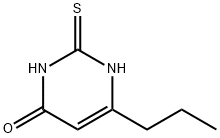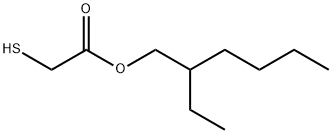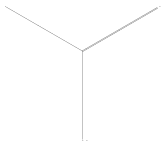6-Propyl-2-thiouracil , 98% , 51-52-5
Synonym(s):
2,3-Dihydro-6-propyl-2-thioxo-4(1H)-pyrimidinone;4-Hydroxy-2-mercapto-6-propylpyrimidine;4-Propyl-2-thiouracil;6-Propyl-2-thiouracil
CAS NO.:51-52-5
Empirical Formula: C7H10N2OS
Molecular Weight: 170.23
MDL number: MFCD00006041
EINECS: 200-103-2
| Pack Size | Price | Stock | Quantity |
| 25G | RMB82.40 | In Stock |
|
| 100G | RMB255.20 | In Stock |
|
| 500G | RMB896.80 | In Stock |
|
| others | Enquire |
PRODUCT Properties
| Melting point: | 218-220 °C (lit.) |
| Density | 1.1880 (rough estimate) |
| bulk density | 159kg/m3 |
| refractive index | 1.5960 (estimate) |
| Flash point: | 300 °C |
| storage temp. | 2-8°C |
| solubility | 1.1g/l |
| form | Solid |
| pka | pKa 7.8; 8.3 (Uncertain) |
| color | White |
| PH | 6-7.5 (5g/l, H2O, 20℃)(slurry) |
| Water Solubility | 1.1 g/L |
| Merck | 14,7869 |
| BRN | 130039 |
| BCS Class | 3 |
| Stability: | Stable. Combustible. Incompatible with strong oxidizing agents, strong acids, strong bases. Light sensitive. |
| CAS DataBase Reference | 51-52-5(CAS DataBase Reference) |
| IARC | 2B (Vol. Sup 7, 79) 2001 |
| NIST Chemistry Reference | Tegretol(51-52-5) |
| EPA Substance Registry System | Propylthiouracil (51-52-5) |
Description and Uses
Propylthiouracil (PTU) is a thioamide antithyroid agent. It inhibits thyroid peroxidase activity in rat and monkey thyroid microsomes (IC50s = 0.081 and 4.1 μM, respectively). PTU (30 mg/kg) increases thyroid weight and serum thyroid stimulating hormone levels and decreases serum 3,5,3''-triiodothyronine and thyroxine levels in rats. Sensitivity to the bitter taste of PTU is genetically mediated and is associated with increased sensitivity to other sweet and bitter compounds. Formulations containing propylthiouracil have been used in the treatment of Graves'' disease and hyperthyroidism.
Antihyperthyroid. Has been used to promote fattening. This substance is reasonably anticipated to be a human carcinogen.
Safety
| Symbol(GHS) |   GHS07,GHS08 |
| Signal word | Warning |
| Hazard statements | H302-H351 |
| Precautionary statements | P280-P301+P312+P330 |
| Hazard Codes | Xn,Xi |
| Risk Statements | 22-40 |
| Safety Statements | 36/37-45 |
| WGK Germany | 3 |
| RTECS | YR1400000 |
| Hazard Note | Harmful/Irritant |
| HS Code | 29335995 |
| Hazardous Substances Data | 51-52-5(Hazardous Substances Data) |
| Toxicity | LD50 orally in Rabbit: 1250 mg/kg |





